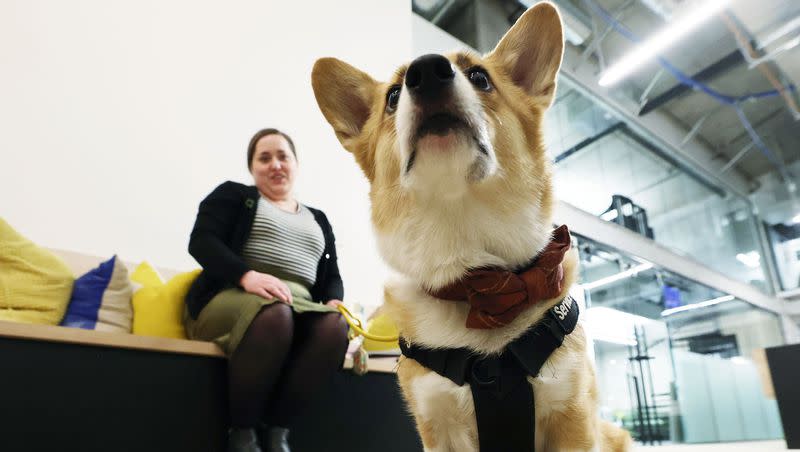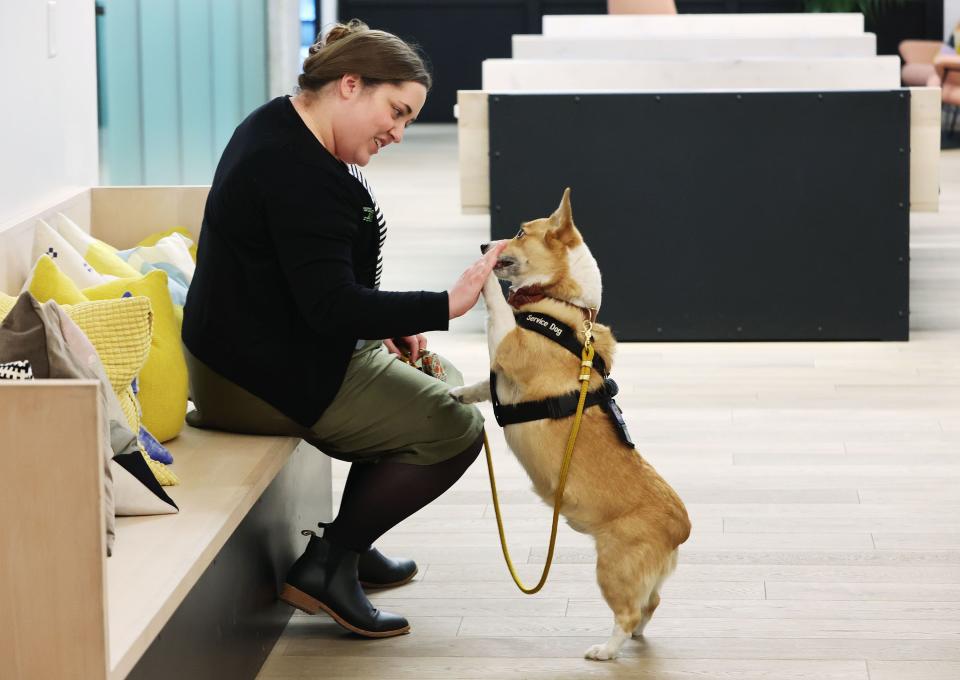Get your dog out of here! Where can service dogs go?

Jefferson the corgi is well-behaved and well-traveled. He’s flown on commercial planes — in the cabin under a seat — to Seattle and to the Northeast a number of times. He’s also been to the symphony, the opera, the theater and scads of movies.
But recently, his mere presence created a stir in a Salt Lake City restaurant, where the manager told Jefferson’s owner, Kathleen Sykes, to “get your dog out of here” or he’d call the police.
It didn’t matter that Jefferson was wearing a vest that identified him as a service animal or that Sykes offered to tell what the dog was trained to do for her — tasks that include picking up items for her since she can’t do it herself because of a serious back injury.
The dog’s presence in the restaurant didn’t violate state or federal law. Service dogs are permitted to go where the public is allowed, with a couple of exceptions. The restaurant manager’s response might have violated both, though the complaint is civil, not criminal.
Nate Crippes, public affairs supervising attorney for the Disability Law Center of Utah, said the center takes a lot of calls from people who feel they are being discriminated against regarding their service animal. Over the years, it has written many letters telling businesses and others what the law says. But the center also gets calls from businesses that want to understand the laws around service animals or want help training their staff, since violations could result in a business or entity being sued in federal court.
Utah law echoes the federal Americans with Disabilities Act, which says qualified service animals are allowed on public transportation, public streets and in shops, restaurants, hotels, theaters and other places the public can go. Religious buildings and private clubs are exempt, though if the latter lets nonmembers in to use some of its facilities, it has to offer someone with a service dog the same access.
A service animal is not the same as an emotional support animal — the federal disabilities act doesn’t protect those — though people often conflate the two. Crippes agreed there’s likely some confusion since a proliferation of websites promise for a small fee to “certify” an emotional support animal, creating an expectation that service animals have paperwork that documents the need for them.
Rules for service animals and emotional support animals are not the same — and neither are the purposes they serve.
Nolo.com writes that “under Utah’s disability rights law, public accommodations must allow you to be accompanied by your qualified service animal.” Qualified means a dog “that has been trained or is being trained to do work or tasks for the benefit of someone with a physical, sensory, psychiatric, intellectual or mental disability.” Animals other than dogs are not service animals under Utah law.

The federal Americans with Disabilities Act says a service animal is usually a dog trained to perform tasks or do work that benefits someone with a disability. The task or work must relate directly to the person’s disability. ADA, as the law is usually known, specifies that in some cases a miniature horse can qualify as a service animal. Crippes notes that federal law trumps state law.
ADA “encourages” but doesn’t require a service animal to wear a vest or have a laminated card or other ID that makes it look official.
Utah is among states that exclude from its definition of service animals those used “solely for emotional support, companionship, comfort, well-being or crime deterrence,” as Nolo.com puts it. ADA doesn’t cover emotional support animals, either.
Disbelief doesn’t matter
Part of the challenge facing those who use service animals is that a disability may not be readily apparent. Guide dogs are easily recognizable as they work with individuals who are blind or visually impaired. But a hearing dog that alerts his handler to alarms, doorbells and other signals might be challenged because a hearing impairment isn’t visible.
Still, a dog trained to hear for someone as a service dog can legally go where the public goes, as long as the dog is housebroken, well-behaved and doesn’t pose a danger to others. That someone else in that public place has a dog allergy or doesn’t like dogs does not change that entitlement.
Dogs have become psychiatric service animals to help their handlers with specific tasks related to emotional and mental disabilities. Seizure-alert service dogs can let their handlers know of impending seizures or guard them during one. Allergen-alert service dogs can ferret out and warn of allergens that could be dangerous or even deadly to their handler.
While a skeptic may crave a certification of some sort, it doesn’t exist. And the law does not require it because of the wide range of disabilities and tasks that a service dog might undertake and the wide range of training that makes that possible.

The person who uses a service animal need not satisfy all curiosity or disclose personal information, including the nature of his or her disability. The two questions that can be asked are whether the dog is a service animal needed because a person has a disability and what tasks it has been trained to perform related to that disability.
Sykes, a former Deseret News employee, said strangers sometimes get quite pushy, though she’s never had an encounter that felt as serious as the recent one in the restaurant. At a fruit stand in northern Utah, she was told she had to put her dog in the shopping cart. She ignored the request, since Jefferson would not be able to perform the tasks for which he trained from a shopping cart. Employers have sometimes questioned her use of a service dog, at least initially.
Nationally, encounters regarding service dogs have been posted with some frequency on social media: A woman who posts on social media as @serviceaussiebailey was shopping when she was accosted by another customer who demanded to see her paperwork or at least know what her disability is, before saying she was going to get the manager “because I don’t believe you.” Such stories are plentiful. Another recent post showed a store employee telling a woman, “Your dog is a pet. Get it out of here,” despite her efforts to explain what the service dog was trained to do and what the law says.
Utah’s Disability Law Center sometimes gets complaints that law enforcement was called and told the individual with a service dog to leave, Crippes said, so sometimes the center has to educate law enforcement.
That doesn’t happen when the police department knows the law and has policy in place —which is the case, for instance, with the Salt Lake City Police Department.
The Deseret News asked a Salt Lake police spokesman whether the department gets many calls regarding challenges to service dogs. Sgt. Mark Wian said he hasn’t personally had such an encounter, but he said the department’s policy manual explains the law and what the police response would be.
The manual states that “if an animal exhibits vicious behavior, poses a direct threat to the health of others or unreasonably disrupts or interferes with normal business operations, an officer may direct the owner to remove the animal from the premises.” Barking alone is not a threat and if the person with the service animal promptly controls the animal, there’s no direct threat either.
Related
Further, “removal of a service animal may not be used as a reason to refuse service to an individual with disabilities.”
Fear that a dog’s owner will not control it is not enough to exclude a service animal. There has to be an actual disruption that is not easily corrected by the animal’s handler, Crippes said.
Police, too, will only ask the two legal questions. Per the manual, “If the individual explains that the animal is required because of a disability and has been trained to work or perform at least one task, the animal meets the definition of a service animal and no further question as to the animal’s status should be asked. The person should not be questioned about his/her disabilities nor should the person be asked to provide any license, certification or identification card for the service animal.”
The police are supposed to be neutral peacekeepers, explaining the ADA requirements and that businesses must allow service animals to accompany their owner wherever other customers or members of the public can go. But they don’t enforce the ADA requirement, as long as there’s no violation outside of ADA. The manual says if the two parties can’t work things out, police can refer the individual with the disability to the Civil Rights Division of the U.S. Department of Justice to make a complaint.
Both local and federal law protect property owners and businesses in the unlikely event a service animal does damage. While housing discrimination is illegal, landlords can, for instance, charge a security deposit for wear and tear, as long as it also charges others, not just the person with the service dog. Crippes likens it to what happens if someone using a wheelchair inadvertently damages a hotel room. That person would have to pay for it; it’s not free just because someone needs a wheelchair.
Rules for flying
Airlines rely on a different, but similar set of rules, according to the U.S. Department of Transportation. The Air Carrier Access Act allows a dog as a service animal, “regardless of breed or type, that is individually trained to do work or perform tasks for the benefit of a qualified individual with a disability, including a physical, sensory, psychiatric, intellectual, or other mental disability. Animal species other than dogs, emotional support animals, comfort animals, companionship animals, and service animals in training are not service animals.”
Airlines can refuse to transport the service dog if it violates safety requirements, poses a direct threat to someone else’s health or safety, causes significant disruption on the plane or at the airport gate area, or violates a destination’s health requirements.
Sykes said when she and Jefferson fly, she has to provide advance notice that she uses a service animal and fill out a form regarding Jefferson’s training, health and behavior. She also has to “attest” that he won’t relieve himself on the plane or can do so in sanitary fashion on long flights.
But the act makes clear that an animal cannot be denied the right to fly just because it “makes other passengers or flight crew uncomfortable.” As long as the animal behaves properly and the paperwork is in place, a service dog is welcome on commercial airlines.
There’s an unwritten rule worth mentioning, as well. Because service dogs are working animals, not pets, people should refrain from petting or interacting with them without specific permission. Even if, like Jefferson, the dog is cute.

